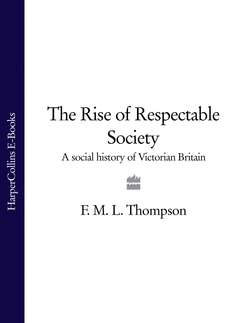The Rise of Respectable Society: A Social History of Victorian Britain

Реклама. ООО «ЛитРес», ИНН: 7719571260.
Оглавление
Литагент HarperCollins USD. The Rise of Respectable Society: A Social History of Victorian Britain
THE RISE OF RESPECTABLE SOCIETY
F.M.L. Thompson
Copyright
Contents
Editor’s Preface
Author’s Preface
CHAPTER ONE Economy and Society
CHAPTER TWO The Family
CHAPTER THREE Marriage
CHAPTER FOUR Childhood
CHAPTER FIVE Homes and Houses
CHAPTER SIX Work
CHAPTER SEVEN Play
CHAPTER EIGHT Authority and Society
Further Reading. 1. Economy and Society
2. The Family
3. Marriage
4. Childhood
5. Homes and Houses
6. Work
7. Play
8. Authority and Society
Index
About the Author. THE RISE OF RESPECTABLE SOCIETY 1830–1900
About the Publisher
Отрывок из книги
A Social History of Victorian Britain
Title Page
.....
The economy and society of the early 1830s, then, was not grossly distorted by the political mirror of the first Reform Act. Factory industry and urban concentrations were present, but not in sufficient proportion to eclipse the familiar world of farm and workshop, labourer, craftsman, and trader, village and small town, and it made reasonable sense to leave authority substantially in the hands which had held it for generations, those of landowners, clergy, lawyers, and greater merchants. The economic foundations of this social and political order were changing rapidly. The most momentous end-product of those changes was the growth of large towns, and it used to be assumed that industrialization and urbanization were synonymous. The distinction between the two processes, however, is critical to understanding the way in which people at all levels of society contrived to weather the shocks and stresses of revolutionary changes in working conditions or living arrangements without society itself experiencing the catastrophic disintegration or outright social revolution which were widely thought, especially in the 1840s, and not only by alarmists, to be inescapable and imminent.
Much more is involved than the observation that not all industry was urban and that not all the fastest growing, or largest, towns were industrial. Although this was a most important point about the early 1830s, when Brighton, emphatically a pleasure rather than a business let alone an industrial town, had been the fastest growing town of the previous decade, and when an important group of water-powered cotton mills were in semi-rural locations, it was of diminishing relevance over the rest of the century. The general tendency was for the mechanization of a broadening range of industrial activities, the adoption of steam power, and a gravitation towards coalfield sites; while all the larger towns supported some manufacturing industries, even if these might in some cases be geared only to their own internal markets. What continued to be important in the shaping of social structures was the diversity of developments within and between industries, in timing, technologies, and organization, and the variety of different occupations and activities forming the economic base of towns.
.....